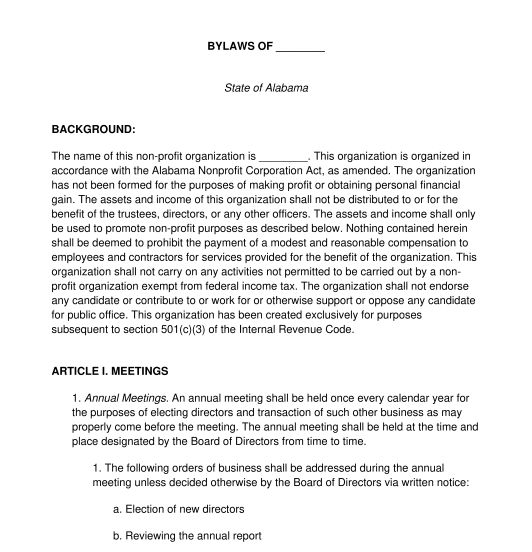 11/05/2025
11/05/2025

Answer a few questions and your document is created automatically.

Your document is ready! You will receive it in Word and PDF formats. You will be able to modify it.




Rating: 4.8 - 1,001 votes
Download a basic template (FREE) Create a customized documentNon-profit bylaws are a document that is used once a non-profit organization has been incorporated. They are used to define the structure and operations of the organization. Bylaws are essentially the rules for how the organization will be governed and describe many of the non-profit's activities, such as annual meetings, the composition of the Board of Directors, and voting procedures. Most states require the creation of Bylaws at the same time, or not long after, the incorporation of an organization.
There are many types of non-profit organizations that may be incorporated in the U.S. However, the most common type of non-profit organization is known as a 501(c)(3). A 501(c)(3) organization is whose purpose is charitable, religious, educational, scientific, literary, testing for public safety, fostering national or international amateur sports competition, or preventing cruelty to children or animals. To find more information about other types of non-profit organizations, please consult the Internal Revenue Service (IRS).
Though both documents are used for newly incorporated organizations, they are used by different types of organizations. Non-profit bylaws may only be used by not for profit organizations. As a result, they do not contain any information about profits or shareholders. Corporate bylaws are used by for-profit organizations, like LLCs or S-Corps. They address division of profits and the rights of shareholders.
Yes, it is mandatory to have non-profit bylaws. Almost all U.S. states require that non-profit organizations create and adopt bylaws as they are being incorporated. Further, the internal revenue service (IRS) requires that if a non-profit is seeking tax-exempt status, they submit a number of organizational documents, including their bylaws.
A board of directors is a group of people who are elected or appointed to supervise the strategic direction of a non-profit. The people selected as directors come from the overall membership of the organization.
Quorum is a term for the percentage of board members who must be present at a meeting in order for the business to conduct business. This is to ensure that important decisions are not made while very few members of the board are present.
Officers are individuals are selected to manage aspects of the day-to-day operations of the organization. Common officer positions include the secretary, treasurer, and president.
Non-profit bylaws should be created in tandem with or not long after the organization creates their articles of incorporation. The articles of incorporation are usually filed with the state before the bylaws are finalized, since the non-profit must exist as a legal entity before it can adopt and operate under bylaws. Both of these documents will eventually be filed with the IRS to become an official non-profit organization with tax-exempt status.
Non-profit bylaws involve a non-profit organization and its directors, officers, and other members. The only organizations that may create non-profit bylaws are those that do not make any sort of profit and are, therefore, eligible for tax-exempt status.
Once this document has been completed and reviewed, it should be printed out, certified, and signed. Generally, if a president or secretary of the organization has already been determined, those individuals are responsible for certifying and signing all corporate documents, including the Bylaws. However, if those roles have not yet been filled, a third party known as an incorporator may sign this document in their absence. The bylaws are then brought to a meeting of the board of directors, where they are officially adopted by the board.
This is only one step in the creation of a non-profit organization. Once the organization has completed and filed their articles of incorporation and written and adopted the non-profit bylaws, they should apply for tax-exempt status with the IRS. They should also ensure compliance with any additional state-specific requirements for non-profits, such as registering as a charitable organization with the state.
Valid non-profit bylaws must contain at least the following mandatory clauses:
In addition to the above mandatory information, the following additional information may be included:
Non-profit creation and structure is generally a matter of both state and federal law. Most states require the creation and filing of Bylaws at the same time as or not long after the creation of the Articles of Incorporation. Organizations must also meet specific requirements under the federal Internal Revenue Code to file as a 501(c)(3) non-profit organization.
You fill out a form. The document is created before your eyes as you respond to the questions.
At the end, you receive it in Word and PDF formats. You can modify it and reuse it.
Guides to help you
Non-Profit Bylaws - FREE - Template - Word & PDF
Country: United States